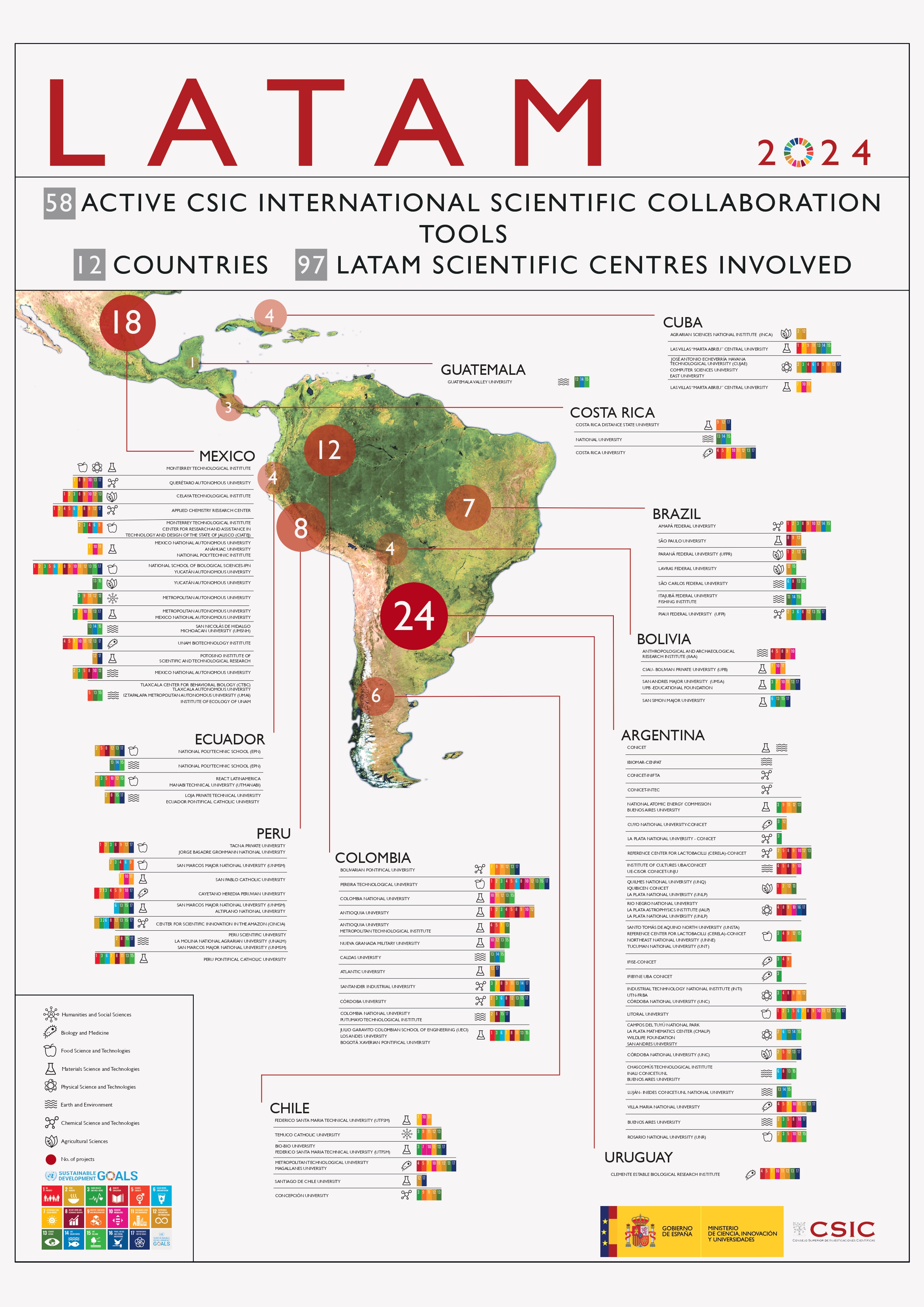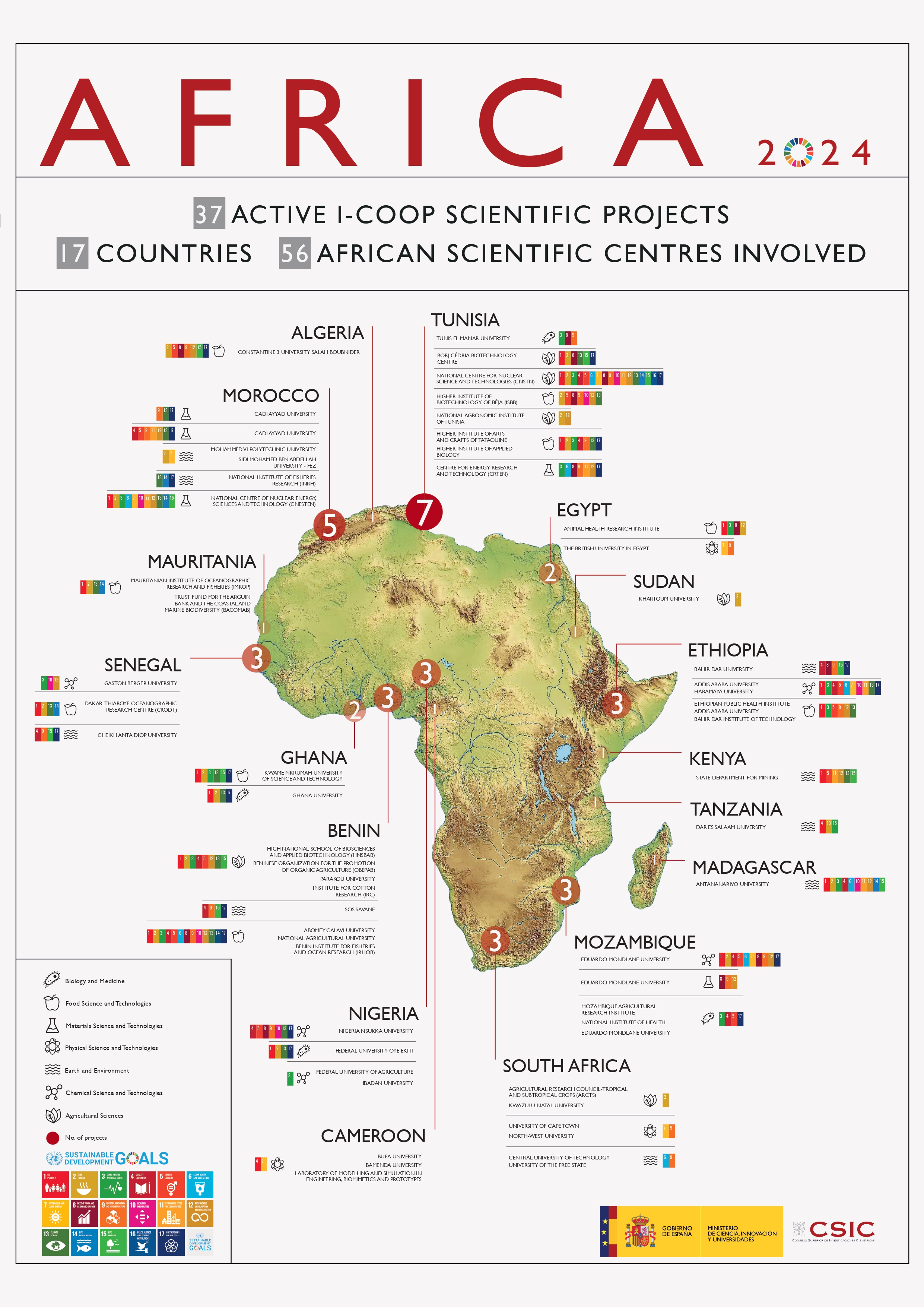The participation of our researchers in these activities of scientific collaboration with international institutions, whether research centers, universities, technology centers or companies are key to strengthening the CSIC. VRI also collaborates with national and foreign organizations in the organization of competitive calls, thus contributing to facilitate access to such grants to the CSIC scientific community.
The International Cooperation and Partnerships Area (ICPA) is responsible for the planning and management of the VRI's own resources for the promotion of internationalization and scientific cooperation, through its own competitive calls, calls co-funded by CSIC, and the signing of international collaboration agreements. This area also coordinates CSIC's participation in ESFRI (European Strategy Forum on Research Infrastructures) and international legal instruments.
Development cooperation programs
VRI works on different development cooperation programs. Investing in science in countries with fewer resources is not only part of the social commitment of the CSIC with these countries; it is an investment through the promotion of new scientific talent.
These programs promote the creation or consolidation of stable links of scientific cooperation between CSIC research groups and those of institutions in developing countries, mainly by financing the mobility of participating groups.
This cooperation is conducted through our own programs such as i-COOP or LINCGLOBAL, co- funded programs such as INTERCOONECTA (AECID), or through bilateral mobility actions in collaboration with foreign or national institutions with which a specific agreement has been signed, such as the TEC of Monterrey (Mexico), the CONICET of Argentina, the Carolina Foundation, etc
The purpose of the CSIC Program of Scientific Cooperation for Development i-COOP is to promote the achievement of the Sustainable Development Goals (SDGs) and contribute to strengthening the scientific-technical training capacities of ODA (Official Development Assistance) recipient countries through two modalities of actions:
- Modality A: Training for pre-doctoral researchers from ODA recipient countries.
The main actions in this modality will consist of stays in CSIC Institutes, Centers or Units (ICU). - Modality B: Training and Knowledge Exchange
The main actions in this modality are based on scientific cooperation through exchanges of best practices, scientific collaborations and stays.
The I-COOP program is open to any thematic area developed by CSIC research groups, and international collaborating groups must belong to countries receiving Official Development Assistance (ODA) according to the updated list established by the Development Assistance Committee (DAC) of the OECD.
Grants are financed up to 30,000 € for two years (15,000 €/year).
The International Laboratory in Global Change is a new tool for research, development and high level training, to facilitate interaction between Ibero-American and Spanish researchers in the field of global change.
The general purpose of the LINCGLOBAL Program is to promote interaction between Ibero-American and Spanish researchers in the field of global change while advancing towards the achievement of the Sustainable Development Goals (SDGs). Specifically, it seeks to understand and predict the impacts of global change on terrestrial and aquatic ecosystems, both in Ibero-America and the Iberian Peninsula, and to formulate strategies to respond to such impacts, as well as to train human resources and disseminate and educate on global change issues.
Its specific objective is to identify strategies to mitigate the impacts of climate change on the most vulnerable terrestrial and aquatic (marine and freshwater) ecosystems and to adapt society to the new scenarios in order to contribute both to the protection of nature and to the health and well-being of future generations..
Grants are financed up to 30,000 € for 30 months.
LINCGLOBAL Call text 2024 (ES) (pdf)
The Plan for the Transfer, Exchange and Management of Knowledge for the Development of Spanish Cooperation in Latin America and the Caribbean (INTERCOONECTA), is the Spanish Cooperation program that seeks to strengthen the institutional capacities of the Public Administration in Latin America and the Caribbean in order to promote changes in public policies in favor of human development.
INTERCOONECTA's purpose is to select training programs aimed primarily at public employees and professionals working in public administration in Latin America and the Caribbean, with the objective of strengthening the institutional capacities of the organizations they serve and facilitating improvements in public policies in favor of sustainable human development.
Our institution is responsible for carrying out a pre-evaluation of the applications submitted for the purpose of pre-selecting the proposals that will later be sent to the AECID for their final evaluation, always within the deadlines set by the latter. On the other hand, it maintains a permanent dialogue with the main researchers who coordinate the programs, as well as with the AECID, regarding all those aspects related to their execution, follow-up and justification.
For further information: https://intercoonecta.aecid.es/intercoonecta
The CSIC - Fundación Carolina Program aims to promote, through its own resources, the mobility of research personnel (researchers, technicians and managers) assigned to the CSIC to research centers and universities in the Ibero-American Community of Nations, except Portugal, Spain and Andorra (hereinafter Iberoamerica) in collaboration with the Fundación Carolina.
The expected impact of the Program is the improvement of the internationalization of the CSIC through the consolidation of stable links of scientific cooperation between CSIC and Iberoamerican teams, by means of research, training or specialization stays of personnel, of a minimum of 6 weeks and a maximum of 12 weeks.


Internationalization programs
The importance of CSIC´s international dimension is reinforced through the creation and participation in specific internationalization programs, whose purpose is to form and consolidate international consortiums of excellence in which CSIC teams participate. The investment of CSIC in these consortiums is expected to become a return so that they can compete competitively in future calls for R&D&I projects in the international field.
The activities that these programs promote are the holding of meetings, seminars and other internationalization activities among the participating research groups, as well as the realization of work stays and specialization of the research groups of the different institutions of the consortium.
From ACRI, the strengthening of this internationalization is articulated through its own programs such as i-LINK, external co-funded programs (such as the CNRS cooperation tools) or through bilateral mobility actions in collaboration with foreign or national institutions with which a specific agreement has been signed, such as the NSTC in Taiwan, the CAS in the Czech Republic, the SAS in Slovakia or the Fulbright Commission in Spain.
The i-LINK program aims to stimulate and promote both the consolidation of stable links of scientific cooperation between CSIC teams and teams from foreign scientific institutions of international relevance, as well as the exploration of new tools for the internationalization of knowledge transfer of our institution.
It is a program without geographical restrictions and open to any thematic area developed at the CSIC. Its objective is to create highly competitive consortia of excellence in the participation of international calls for R&D&I projects, in order to promote the transfer of knowledge, and allowing and encouraging the participation of business partners.
The I-LINK program promotes the holding of meetings and seminars between the participating research groups, the exchange of work stays, as well as the specialization of the members of the CSIC research groups and the international counterpart.
Grants are financed up to € 30,000 for two years (15,000 euros/year).
i-LINK 2024 Call text (EN) (pdf)
Large Research Infrastructures (LRIs) represent the paradigm of collaborative science and are one of the main drivers of science policy on a global scale. They provide essential services to public and private research, essential for expanding the frontiers of knowledge. They generate innovation, connecting researchers and companies in the joint development of new technologies and applications, thus laying the foundations for addressing global challenges and industrial competitiveness.
The specific objective of the call is to contribute to position the CSIC in large European infrastructures and international consortia and to promote participation, through the support and reinforcement of CSIC research groups in the infrastructures framed in the European Strategic Forum for Research Infrastructures (ESFRI) and included in the ESFRI Roadmap 2021.
Call for Proposals on Large European Research Infrastructures 2024 (ES) (pdf)
The Bilateral Program aims to stimulate, through its own funding, the collaboration between CSIC research groups with research groups from various foreign institutions with which a collaboration agreement has been signed and which are currently:
- National Science and Technology Council (NSTC)
- Czech Academy of Sciences (CAS)
- Slovak Academy of Sciences (SAS)
- Monterrey Institute of Technology (TEC)
- National Council for Scientific and Technical Research of Argentina (CONICET)
The expected impact of the Program is the improvement of the internationalization of the CSIC through the consolidation of stable links of scientific cooperation between CSIC teams and teams belonging to institutions based in the aforementioned countries, through the realization of work and specialization stays of research groups from these institutions.
Grants are financed for a duration of two years.
Bilateral Actions Call text 2024
The CSIC-Fulbright Program aims to promote, through its own resources, the mobility of research personnel (researchers, technicians and managers) assigned to the CSIC to U.S. research centers and universities and, through collaboration with the Fulbright program, to facilitate the arrangements for mobility and contribute to the successful completion of the stay in the United States.
The expected impact of the Program is the improvement of the internationalization of the CSIC through the consolidation of stable links of scientific cooperation between CSIC teams and those of the United States of America (USA), by means of research, training or specialization stays of personnel.
CSIC-Fulbright Call text 2024

